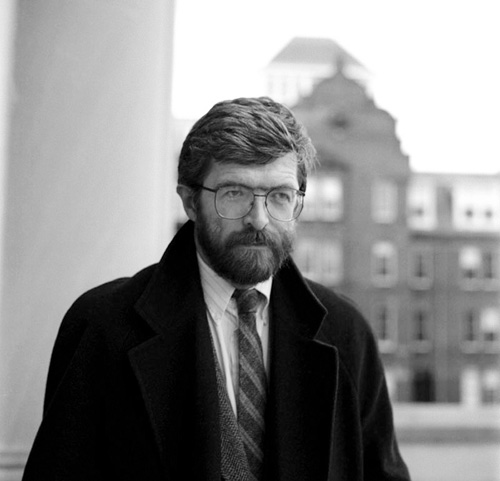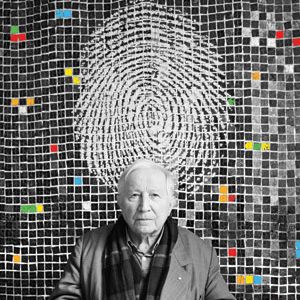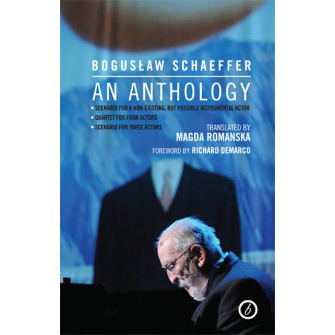
Stanisław Barańczak
PHOTO: Elżbieta Lempp
VIA: Culture.pl
A much loved, gifted and extraordinarily talented activist and translator, his translations of Polish poetry to English are a joy, and those from English to Polish are a monumental achievement, ranging from almost all of Shakespeare to Dr. Seuss.
Poetry has always been a desperate call for fair play, for sticking to the human/humane rules of the game. The fact that the game’s partner—nature, an oppressive regime, death, history, God himself—is not necessarily human, much less humane, does not really matter. The poet is a tenant who reluctantly admits that, yes, he should have read the fine print before signing the lease, but is also cocky enough to insist that, fine print or not, he does not deserve to be treated by his landlord like dirt.
(Stanisław Barańczak, “Introduction,” The Weight of the Body: Selected Poems, ii–iii, 1989)
From the perspective of long cultural duration, the generations to come will determine which aspects of the tremendous legacy endowed by Stanisław Barańczak upon his readers are deemed most precious. In 1994 the journalists of the Poznań edition of the daily Gazeta Wyborcza awarded him the honorable title of Giant, an annual distinction given to those whose work ethic reflects the qualities of laboriousness, diligence, and perseverance that in Barańczak’s native city of Poznań are considered the region’s venerable trademarks. Indeed, it is hard to fathom how much he managed to produce in sixty-eight years of life marred by several years of increasingly debilitating illness. Ten volumes of poetry, starting with his debut, Korekta twarzy (Face editing), in 1968, to the last volume of Chirurgiczna precyzja (1998), for which he was awarded the Nike, the highest literary prize in Poland; two monographs (on Miron Białoszewski and Zbigniew Herbert); several volumes of essays ranging from close readings of personalized license plates to reflections on the existence of God; endless anthologies of his own translations, mainly from English (with some Russian and German in the mix), and the crowning glory of a new rendering of almost the complete works by William Shakespeare.
Barańczak’s mastery—and in this case this debatable label cannot be debated—of diverse genres of expression was awe-inspiring. He said once that he is a full-time translator and a part-time poet, but even if translation took most of the time at some point of his career, it was really the poet in him that drove everything he did.
He would probably find it somewhat ironic that the first responses to his death in the Polish media emphasized as the context for his work his political involvement with the dissident movement in 1970s Poland; his work as a founding member of the Workers’ Defense Committee, KOR (a seminal organization for the birth of Solidarity); and his being fired from the faculty of his alma mater, Adam Mickiewicz University in Poznań, for his political opposition. All of this he did and it was admirable and courageous, but he would perhaps be somewhat put off by the fact that in his prolific life the image assigned to him relatively early on has so persisted, a cultural straitjacket for his amazing range. At the same time it’s not surprising that this is how his Polish audience still sees him. Barańczak was a well-known dissident and his early poetry invites political—sensu stricto—readings. He was a leading poet of the New Wave or so-called Generation 68, that is, the generation for whom the student riots of March 1968 and later the bloody 1970 protests were a formative experience. His poetry was engaged in the search for a new poetic idiom in “the language in which the word truth is a newspaper name and ‘freedom’ and ‘democracy’ are administered by a police chief” (as he wrote in his early poem “N.N. starts asking questions”). Stepping outside the tradition of poetry coded with historical and political metaphors, Barańczak’s generation sought truth in the colloquial and the everyday. The idea was to make the Polish language, abused by the regime’s New Speak, have meaning again on the most fundamental level. A tangible vocabulary of shopping lists and quotidian activities ironically juxtaposed with the idiom of communist media made old-fashioned notions of dignity and freedom resonate again with powerful freshness. At the heart of this poetry wasn’t, however, a social activist but an existential loner; the project was deeply individual, just as the price for claiming one’s freedom is deeply individual. It was a poetry of fierce desire to practice independence, a poetic task doomed to failure if only for the paradox that in the context of Barańczak’s native culture of his youth, no poet could be allowed to claim such desire as his own. He protested, but was sentenced to the collective captivity in an all-consuming Romantic tradition of placing poets on cultural barricades.
When Barańczak and his family left Poznań in 1981 during the “carnival of Solidarity” (a period between the birth of Solidarity in August 1980 and the martial law of December 1981) he did not know that martial law would change what was to be a three-year contract to teach at Harvard University to a contract for the rest of his life. It is the American chapter of Stanisław Barańczak’s life that is most prolific and yet much less known to his Polish audience and certainly less Romantic than his young dissident years. For Poles there seems to be an invisible line dividing Barańczak’s life into part one—biography fused with writing—and part two—writing without biography. Yet, it’s good to remember that for most of the 1980s, with Solidarity under ground, the Barańczak home in Massachusetts was an influential cultural space for Poland’s diaspora. Barańczak was actively engaged in things Polish and kept writing about Poland. He cofounded and contributed to such significant émigré publications as the Parisian Zeszyty Literackie, on whose editorial board he served from 1983 on; such activities reflected the ethical claims he made for literature in his well-known essay collection Ethics and Poetics (1979).
Life in suburban Newtonville felt sometimes as exile although in one of his poems he strongly argued against the word. Out of his element—the element being the Polish language—and as if as an act of compensation — he showered audiences on both sides of the Atlantic with the great gifts of his translatorial talent. For English-speaking audiences he is probably best known as co-translator with Clare Cavanagh of Wisława Szymborska and of the superb anthology Spoiling Cannibals’ Fun: Polish Poetry of the Last Two Decades of Communist Rule (1991). Some may know his moving rendition of Laments, a cycle of elegies by the 16th-century poet Jan Kochanowski, on whose translation he collaborated with Seamus Heaney (1995). From the perspective of a Polish reader, life in English brought to fruition his fascination with English-language poetry and fully articulated his immense capacity for translation. He published anthologies of 17th-century English metaphysical poetry (including Donne and Herrick); in 1990 he created the series Biblioteka Poetów Języka Angielskiego (Library of English Language Poets), in which he anthologized and translated such poets as Emily Dickinson, John Keats, W. H. Auden, Seamus Heaney. Each edition of the series—still popular and widely read—was awaited impatiently by Polish poetry-lovers. Their humorous numeric titles give away the size of the enterprise: Elizabeth Bishop: 33 Poems; Emily Dickinson: 100 Poems (followed by Emily Dickinson: Another 100 Poems); W. H. Auden: 44 Poems; Seamus Heaney: 55 Poems; Robert Frost: 55 Poems; Robert Herrick: 77 Poems; From Chaucer to Larkin: 400 Hundred Immortal Poems of 125 English-speaking Poets from 8 Centuries (Od Chaucera do Larkina. 400 nieśmiertelnych wierszy 125 poetów anglojęzycznych z 8 stuleci). And so on.
He would treat this titanic labor lightly, crediting his productivity to the fact that translating was his favorite pastime and that he loved word games and puzzles, and that translations are such games even in their most intellectually and spiritually enriching forms. The sheer pleasure of crafting and playing with his native language permeates Barańczak’s effervescent translations of Dr. Seuss—I can’t imagine any other translator being able to introduce this American classic to Polish children. Barańczak wanted to be playful. One of his most popular anthologies is of light verse, or, to translate its title literally from the Polish, Purple Cow: 333 Most Famous Specimens of English and American Non-Serious Poetry from William Shakespeare to John Lennon (Fioletowa krowa. 333 najsławniejsze okazy angielskiej i amerykańskiej poezji niepoważnej od Williama Shakespeare’a do Johna Lennona. Antologia).
His translations were masterpieces of craft and invention. He considered each act of translation as, first of all, an act of close reading; what needs to be found in translation is a kind of objective correlative for the effect that the original creates with its formal qualities. His renditions are unmistakably his, immediately recognizable as Barańczakian for their matchless rhythm and rhyming. Never translate good poetry into bad poetry, was his motto—if you cannot translate Akhmatova’s measures, you’d better turn your attention to cultivating cacti. (In general, his pen was sharp; for those who would like to see what it meant for Barańczak to have a field day with some graphomaniac writing of the Polish People’s Republic I recommend Książki najgorsze 1975-1980 [Worst Books]).
He had an amazing ear for the cadences of a spoken language: no wonder his translations of Shakespeare’s plays are cherished by actors who feel as if he exacted each line by counting their steps on stage. This impeccable sense of linguistic musicality manifests itself in Barańczak’s collection Podroż zimowa (Winter Journey, 1994), containing his original poems, which can be read independently but also to the music of Schubert’s Winterreise. The precision of each verse matches Schubert’s music and becomes a modern rewriting of Willhelm Müller’s Romantic songs. Polish critics are right when they claim that what began as search for simplicity in Barańczak’s early poetry concluded with Parnassian virtuosity of Baroque provenance.
I can’t imagine what more could be accomplished in one lifetime. He couldn’t make peace with the fact that his sickness prevented him from doing more. He gave both of his worlds—Polish and English—so much that we can only feel humble when faced with such potency and generosity. To his beloved wife Ania he dedicated all his books, and although it was his brilliant mind and antlike labor behind his work, it was her heart and devotion that made it possible for him to exercise his talents throughout his life, particularly in the last couple of decades. Her love and loyalty made the Stanisław Barańczak as we—his readers and friends—know him, possible.
CR




Pingback: Welcome to our Spring 2015 issue!
THANK YOU, Irene and Cosmo team, for another wonderful Review I’m itching to read in detail.
Meanwhile, may I give particular thanks for Joanna Nizynska’s excellent, sensitive article on Stanislaw Baranczak and the tremendous work he managed to accomplish — in spite of his heartbreakingly long struggle against Parkinson’s disease. Nizynska’s fascinating overview of Baranczak’s talent and achievements make me want to go back to reading more of his writing.
And I appreciated the final lines with their well-earned tribute to his wife’s, Anna’s indispensable role.
Gratefully,
Renia Romer
Pingback: Tribute to Stanislaw Baranczak – One of the Best Polish Translators of All Times
Pingback: Tribute to Stanislaw Baranczak